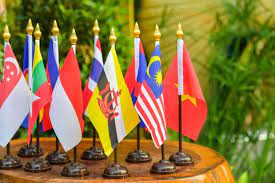The Republic of Indonesia's Free and Active Political Policy in International Relations Between Nations Kebijakan Politik Bebas Aktif Negara Republik Indonesia di dalam Hubungan Internasional Antar Bangsa
Main Article Content
Abstract
A country's foreign policy is a means to achieve the desired goals for the national interests of the country. Likewise with Indonesia, establishing cooperation in the international world and between countries is not a taboo. With the principle of free and active politics as a guideline for Indonesia in exploring the wilderness of the international world which is full of various interests and conflicts, Indonesia must be able to formulate its foreign policy policies well, not only limited to national interests but must be able to show contributions to the international world so that Indonesia's name can be taken into account in its goal of becoming a Middle Power country. Indonesia's foreign policy line cannot be separated from the views and ideology of the ruling regime, whether using persuasive or confrontational diplomacy. Even the principle of free and active which is currently held has an ambiguous interpretation or meaning, whether the free and active in question is free in the sense of being neutral in international conflicts between nations, but still actively providing solutions and contributions in resolving conflicts, or free and active in the context of being free to have one's own views and stances to support or not support an entity or country in an international conflict based on the foundation and limitations of the country's constitution. Interestingly, both of these meanings of active freedom have been applied in Indonesia's foreign policy.
Article Details

This work is licensed under a Creative Commons Attribution-NonCommercial-ShareAlike 4.0 International License.
The Authors(s) retain copyrights of the Article published on Semarang State University Undergraduate Law and Society Review. However, before publishing, it is required to obtain written confirmation from Author(s) in order to ensure the originality (Author Statement of Originality). The statement is to be signed by at least one of the authors who have obtained the assent of the co-author(s) where applicable. This work licensed under a Creative Commons Attribution-NonCommercial-ShareAlike 4.0 International (CC BY-NC-SA 4.0).
References
Hatta, Mohammad, (1951). Mendajung Antara Dua Karang : Keterangan Pemerintah diutjapkan Oleh Drs. Mohammad Hatta di Muka Sidang BPNKP di Djokja pada Tahun 1948. Djakarta: Kementerian Penerangan Republik Indonesia
Kusmayadi, Yadi. 2017. Politik Luar Negeri Republik Indonesia Pada Masa Konfrontasi Indonesia- Malaysia Tahun 1963-1966. Jurnal Artefak. Volume 4 Nomor 1, April 2017. Halaman 23-34. DOI: http://dx.doi.org/10.25157/ja.v4i1.732
Litbang Kompas. (2019). Seri Pemimpin Bangsa Mohammad Hatta: Pencetus Politik Bebas-Aktif. Jakarta: Kompas
Mansbach, Richard W ., dan Kirsten L Rafferty. (2021). Kebijakan Luar Negeri dan Perang: Seri Pengantar Politik Global. Bandung: Nusa Media
Mila, Nasihatul., Dkk. 2020. Sejarah Perkembangan Politik Luar Negeri Indonesia Masa Pasca Reformasi. Jurnal Pendidikan PKN Pancasila dan Kewarganegaraan. Volume I Nomor 2, November 2020. Halaman 73-100. http://dx.doi.org/10.26418/jppkn.v1i2.40866
Pusat Data dan Analisa Tempo. (2021). Kebijakan Politik Luar Negeri Presiden Soeharto Terkait Konflik Timur Tengah. Jakarta: Tempo Publising
Rizky, Alif, dkk. 2018. Haluan Baru Politik Luar Negeri Indonesia: Perbandingan “Middle Power” Susilo Bambang Yudhoyono dan Joko Widodo. Jurnal Hubungan Internasional Volume 6 Nomor 2, Maret 2018. Halaman 151-168. https://doi.org/10.18196/hl.62112
Rofii Adji Sayekti, Moh, (2018). Peranan Politik Luar negeri Bebas Aktif dalam Percaturan Global. Yogyakarta: Cempaka Putih
Soenanda, Moenir Ari. Kebijakan Luar negeri dan Strategi Indonesia di Kawasan Asia Pasifik, Makalah Diklat BIN disampaikan pada 25 Agustus 2006
Triwahyuni, Siti Nuraili., Dkk. 2021. Implementasi Prinsip Kebijakan Luar Negeri Bebas Aktif Dalam Diplomasi Mengatasi Konflik Rohingya. Jurnal Indonesia Sosial Sains Volume 2 Nomor 12, Desember 2021. Halaman 2118-2125. https://doi.org/10.36418/jiss.v2i12.481
Undang-Undang Nomor 37 Tahun 1999 Tentang Hubungan Luar Negeri
Vermonte, Philips Jusario. Politik Luar Negeri Indonesia: Antara Idealisme dan Rasionalisme, dalam Media Indonesia , 20 Desember 2002
Widhiyoga, Ganjar, & Setyasih Harini. 2019. Politik Luar Negeri Indonesia di Masa Reformasi (1999-2014). Research Fair Unisri Volume 3 No 1 Januari 2019 Halaman 561-578. https://doi.org/10.33061/rsfu.v3i1.2618
Widiatmadja, Aji, & Ulul Albab.2019. Indonesia di Era Susilo Bambang Yudhoyono dan Joko Widodo: Kebijakan Luar Negeri di Tengah Dinamika Lingkungan. Jurnal Politica Volume 10 Nomor 1 Mei 2019. Halaman 77-93. https://doi.org/10.22212/jp.v10i1.1313
Windiani, Reni. 2013. Politik Luar Negeri Indonesia dan Globalisasi. Politika: Jurnal Ilmu Politik, Volume. 1 Nomor 2, Mei 2013. Halaman 88-98, 2013. https://doi.org/10.14710/politika.1.2.2010.88-98
